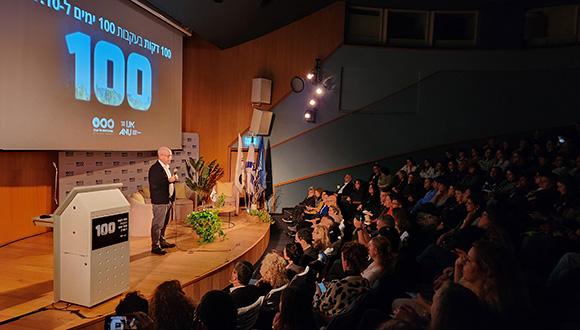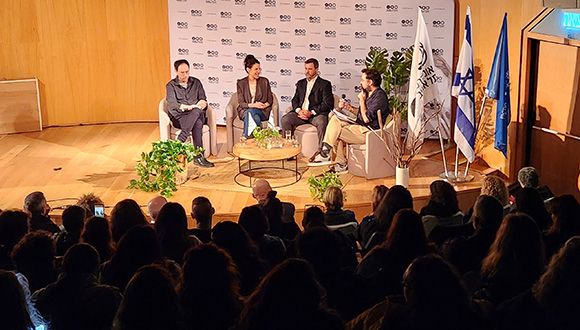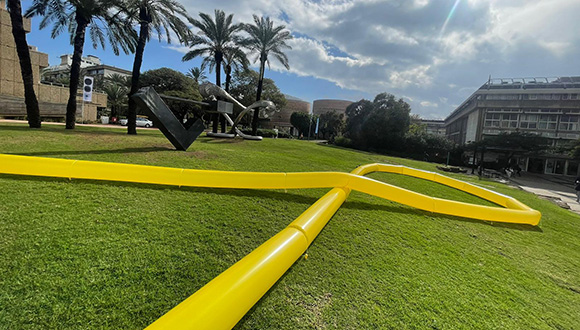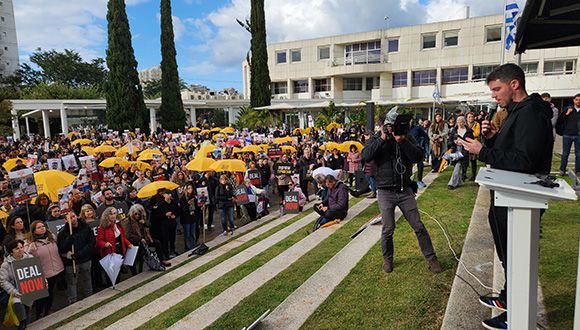Tel Aviv University Marks 100 Days Since the Hamas Attack
TAU aimed to reflect on the impact the last 100 days of war on various fields of research, express our support families of the hostages, and to rally together in the cry to bring all hostages home.
On January 14, the Tel Aviv University community marked 100 days since the Hamas attack on Israel. In various events across campus, TAU aimed to reflect on the impact the last 100 days of war on various fields of research, express our support families of the hostages, and to rally together in the cry to bring all hostages home.
100 Minutes for 100 Days: Examining the Impact of War
The inaugural event, '100 Minutes for 100 Days,' brought together researchers from diverse fields such as psychology, ecology, and information technology. Adopting a TED-style format, the researchers presented the impact the war has had on their various fields. The event concluded with a panel discussion moderated by Dr. Jeremy Fogel from the Department of Jewish Philosophy in the TAU Faculty of Humanities.

Prof Ariel Porat speaking at the ‘100 minutes for 100 days’ ceremony
"Tel Aviv University is an ark which will save us from the flood and allow us to build a new world that will come afterwards" (Dr. Jeremy Fogel)"
The event opened with an address from Prof. Ariel Porat, President of Tel Aviv University. In his speech, he rallied the university community, urging both faculty and students to unite and fortify national resilience. He remarked, "Our open wound does not cease to bleed. Since October 7, 15 of our students have lost their lives, and over 60 families within the university community have experienced the profound pain of losing their loved ones. We collectively mourn their tragic deaths and yearn for the safe return of the soldiers and all the hostages."
Prof. Porat then spoke about the decision to start the fall semester. "We realized that if we don't do this, everyone will be hurt. We created a support network to help our students who are currently serving in the IDF, so as not to let them fall behind in their studies.We all feel that we owe them a lot; that is a debt that will never be fully repaid. And now it's our turn to protect them, their careers, and give back to them even a little in return for what they’re doing for all of us."
For our national resilience it is important to try and maintain some kind of routine in the time of the war. This is crucial for the future of the State of Israel. “We cannot afford the luxury of putting the economy or higher education on hold, hoping that everything will somehow turn out fine. We mustn't cease the production of doctors for the health system, engineers, tech professionals, psychologists, and more. It is imperative that we rise to the task of the national importance that lies before us," he concluded.
Dr. Lior Zalmanson, a senior lecturer and assistant professor at the Technology and Information Management Program, Coller School of Management, specializes in studying human behavior in virtual environments. In his discussion, he explored the role of AI in wartime communication and how technology companies influence narratives. Dr. Zalmanson also highlighted the potential dangers of AI in our daily digital interactions, pointing out its capacity to introduce biases in opinions, particularly through the presentation of specific verbal or visual content.
Prof. Marcelo Sternberg, a climate change scholar and the head of the Plant Ecology Lab in the George S. Wise Faculty of Life Sciences, addressed a less-discussed aspect of the war's impact. "I am excited to talk to you about a subject that may not receive much attention in the media," he began, diving into topics such as soil contamination with heavy metals and explosives, the destruction of various habitats for plants and animals, the severe disruption to Israel’s food security caused by the shutdown of numerous farms in proximity to Gaza, and more.
Dealing with Post-Trauma
Dr. Michal Kahn, a licensed clinical psychologist and the head of Sleep Research laboratory from the Gershon H. Gordon School of Psychological Sciences in the Faculty of Social Sciences, is part of the team of therapists working at the newly opened National Trauma and Resilience Center, which operates on TAU campus and provides PTSD treatment at a nominal cost to affected civilians and IDF soldiers.
"These moments, face-to-face with the terrorists and the shootings, have, of course, been with her ever since – there is no escaping from them, 'and yet', as she tells me, I'm a simple case'"

The panel of experts. From the left to right: Dr. Lior Zalmanson, Dr. Michal Kahn, Prof. Marcelo Sternberg, and Dr. Jeremy Fogel
Kahn talked about the psychological aspect of the war, highlighting the increased incidence of anxiety disorders and PTSD. She also offered insights into potential treatment methods and provided a glimpse into her volunteer work with survivors of the Nova party.
“While they were being led into Gaza, Rimon asked Yagav ‘what should we do? They took your guitar that you love so much,' and he answered with the simplicity that is so characteristic of him: 'If one child learns to play and is happy, at least one good thing has happened'" (Nofer Buchstab, PhD student in the Faculty of Life Sciences, about the moment of her brother's kidnapping)"
Unity and Remembrance: TAU Campus Rally
"Hundreds of people, including hostage family members, Prof. Ariel Porat (the President of the university), and Daniel Zilber (the chairman of the Student Union), participated in the rally held on the TAU campus. Classes were suspended for an hour, and the entire university community gathered in the rain to call for the release of all the hostages, who have been held captive in Gaza for 100 days.
Among those speaking at the rally were:
- Nofer Buchstab, PhD student in the Faculty of Life Sciences, sister of Yagav Buchstab, kidnapped from Kibbutz Nirim together with his partner Rimon. Rimon was released from captivity, but Yagav is still held in Gaza.
- Gil Dickman, cousin of Carmel Gat, who was kidnapped from Kibbutz Be’eri. Carmel is a graduate of the TAU Faculty of Medicine with a bachelor's in occupational therapy and a graduate student in therapy and occupational therapy at the Hebrew University. Gil is a graduate of the School of Psychological Sciences at Tel Aviv University.
- Merav Svirsky, sister of Itay Svirsky, who was kidnapped from Kibbutz Be’eri. Itay is a TAU graduate with degrees in psychology and economics. His cousin is Prof. Uri Ben-David from the Faculty of Medicine. Merav and Itay's parents were murdered by Hamas on Black Sabbath on October 7.
- Yifat Calderon, cousin of Ofer Calderon, who was kidnapped from Kibbutz Nir Oz, along with his children Sahar and Erez. Sahar and Erez were released, but Ofer still remains in captivity. Yifat is one of the leaders of the Hostage Forum that brings together relatives of the hostages.
- Anat Shoshani, a student at the Faculty of Management, the granddaughter of Adina Moshe, who was kidnapped from the Nir Oz compound and released from captivity. Anat's grandfather, Said Moshe, was murdered.
- Stav Levy, a student at the School of Architecture, the partner of Idan Shativ, who was kidnapped from the Nova festival.
At the end of the campus rally, faculty members and students marched to the Hostage Square in the center of Tel Aviv to join the remembrance ceremony there.
The day concluded with a One Million Bells event held at the Lowy International School where members of TAU community gathered to ring bells for one full minute to show solidarity with the hostages.

Artist Doron Gazit presented a display featuring yellow balloons made from recycled materials, shaped in the form of the iconic yellow ribbon associated with the ongoing effort for the return of the hostages.






